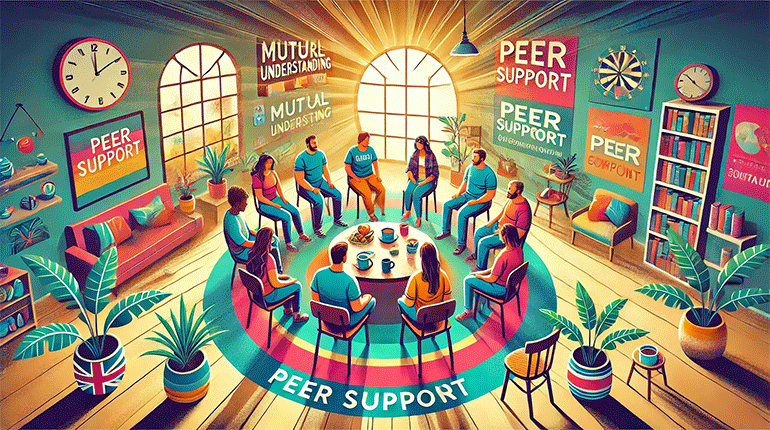The Role of Peer Support Networks in Improving Mental Health Outcomes in Britain
Peer support networks are becoming a cornerstone of mental health care in Britain. Rooted in shared experiences and mutual understanding, these networks empower individuals to navigate their mental health challenges with the help of others who have walked similar paths. Their increasing prominence reflects a shift toward more holistic, community-based approaches to mental health.
Understanding Peer Support Networks
Peer support involves individuals with lived experiences of mental health challenges offering support to others facing similar issues. Unlike clinical settings, peer support networks prioritize empathy, equality, and mutual respect, creating a safe space where individuals can share openly without fear of judgment.
These networks operate in various forms:
- Face-to-Face Groups: Regular meetings in community centers or other accessible locations.
- Online Forums and Communities: Virtual spaces for sharing and support, often accommodating those who cannot attend in person.
- One-to-One Peer Mentoring: Personalized support from a trained peer mentor.
Key Benefits of Peer Support Networks
Reduction in Stigma
Engaging with peers normalizes conversations about mental health, breaking down the stigma that often prevents individuals from seeking help.Improved Mental Health Outcomes
Studies show that peer support reduces symptoms of anxiety and depression, enhances self-esteem, and improves overall well-being.Accessibility
Peer support is often free or low-cost, making it accessible to individuals who might face financial or systemic barriers to traditional mental health services.Empowerment and Resilience
Sharing experiences fosters a sense of empowerment. Participants often gain confidence in managing their mental health and supporting others.
Notable Peer Support Networks in Britain
Mind’s Peer Support Network
One of the largest initiatives in the UK, Mind’s network connects individuals through in-person groups and online platforms. Their resources cater to various mental health challenges, ensuring inclusivity.Hearing Voices Network (HVN)
HVN provides specialized support for individuals who experience auditory hallucinations. Their groups challenge stigma and offer a community where participants can share coping strategies.Big White Wall (now Togetherall)
An online platform offering anonymous peer support moderated by professionals, Togetherall caters to those who prefer virtual spaces.Carers UK
Focused on the mental health of caregivers, Carers UK runs peer support forums where members can share their unique challenges.
The Impact on Mental Health Outcomes
Peer support networks contribute significantly to Britain’s mental health landscape:
- Filling Gaps in Services: These networks offer immediate support, especially in areas where NHS mental health services are stretched thin.
- Complementing Clinical Care: They provide ongoing, community-based support that complements therapy or medication.
- Building Community Resilience: By fostering connections, these networks enhance the collective mental health of communities.
Challenges and Opportunities
While peer support networks are highly effective, they face challenges:
- Sustainability: Many rely on volunteers and face funding constraints.
- Training and Quality Assurance: Ensuring peer mentors are adequately trained is essential to maintaining effective and safe support.
- Awareness: Increasing public knowledge about these networks is crucial for maximizing their reach.
To address these challenges, partnerships with formal mental health services and increased investment are vital. The integration of peer support into the broader mental health system can ensure its sustainability and scalability.
The Path Forward
As Britain continues to prioritize mental health, peer support networks are poised to play an even more significant role. They exemplify the power of community in fostering healing and resilience, reminding us that no one has to face their struggles alone. By valuing lived experiences and mutual understanding, these networks pave the way for a more compassionate and inclusive approach to mental health care.


